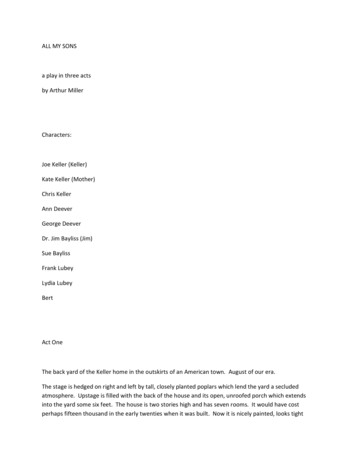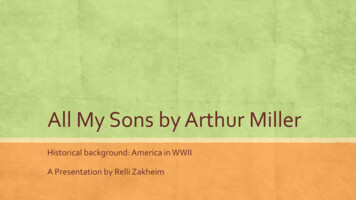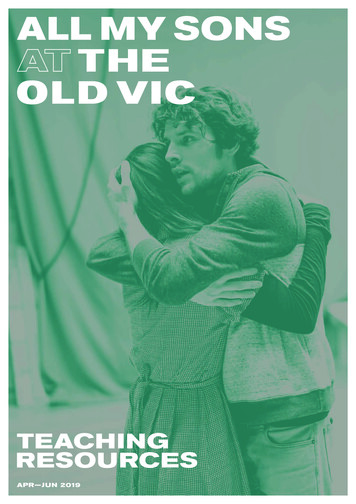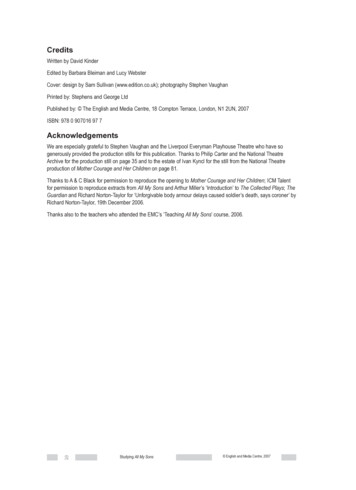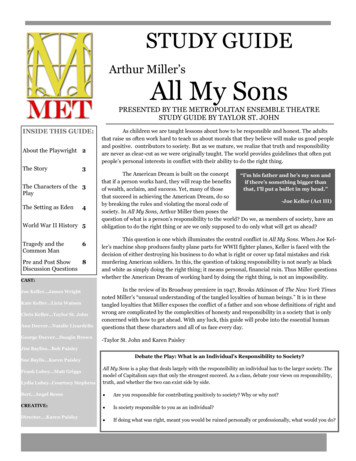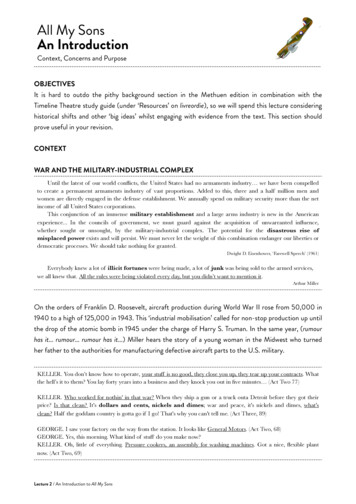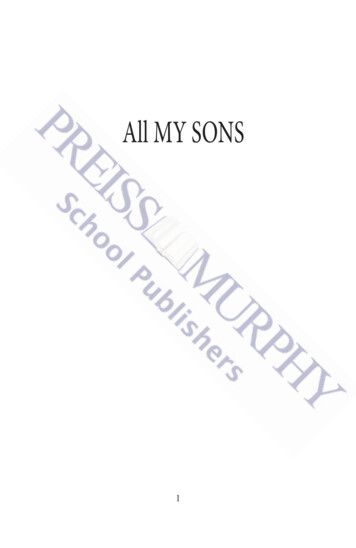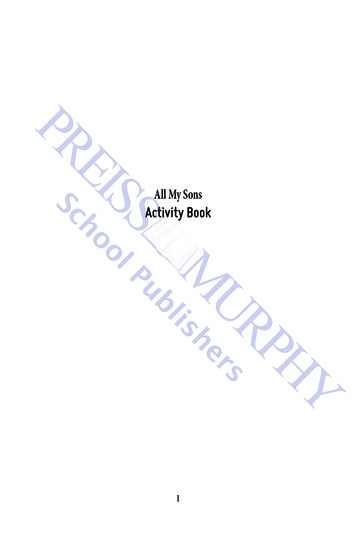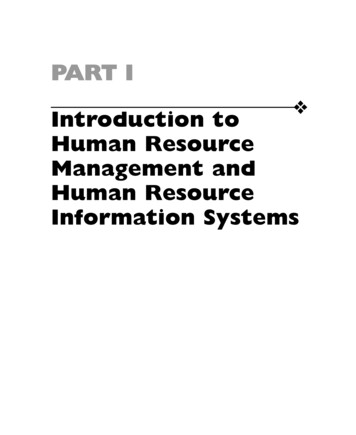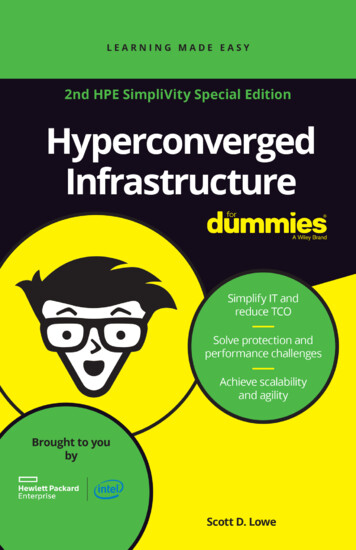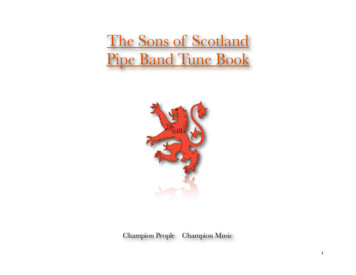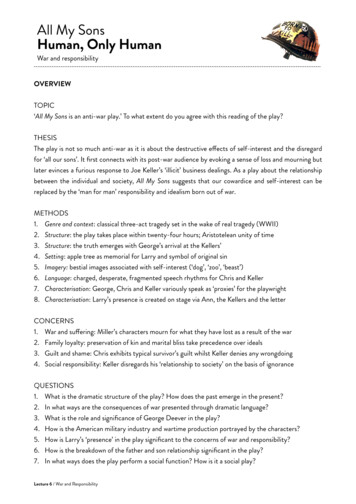
Transcription
All My SonsHuman, Only HumanWar and responsibilityOVERVIEWTOPIC‘All My Sons is an anti-war play.’ To what extent do you agree with this reading of the play?THESISThe play is not so much anti-war as it is about the destructive effects of self-interest and the disregardfor ‘all our sons’. It first connects with its post-war audience by evoking a sense of loss and mourning butlater evinces a furious response to Joe Keller’s ‘illicit’ business dealings. As a play about the relationshipbetween the individual and society, All My Sons suggests that our cowardice and self-interest can bereplaced by the ‘man for man’ responsibility and idealism born out of war.METHODS1. Genre and context: classical three-act tragedy set in the wake of real tragedy (WWII)2. Structure: the play takes place within twenty-four hours; Aristotelean unity of time3. Structure: the truth emerges with George’s arrival at the Kellers’4. Setting: apple tree as memorial for Larry and symbol of original sin5. Imagery: bestial images associated with self-interest (‘dog’, ‘zoo’, ‘beast’)6. Language: charged, desperate, fragmented speech rhythms for Chris and Keller7. Characterisation: George, Chris and Keller variously speak as ‘proxies’ for the playwright8. Characterisation: Larry’s presence is created on stage via Ann, the Kellers and the letterCONCERNS1. War and suffering: Miller’s characters mourn for what they have lost as a result of the war2. Family loyalty: preservation of kin and marital bliss take precedence over ideals3. Guilt and shame: Chris exhibits typical survivor’s guilt whilst Keller denies any wrongdoing4. Social responsibility: Keller disregards his ‘relationship to society’ on the basis of ignoranceQUESTIONS1. What is the dramatic structure of the play? How does the past emerge in the present?2. In what ways are the consequences of war presented through dramatic language?3. What is the role and significance of George Deever in the play?4. How is the American military industry and wartime production portrayed by the characters?5. How is Larry’s ‘presence’ in the play significant to the concerns of war and responsibility?6. How is the breakdown of the father and son relationship significant in the play?7. In what ways does the play perform a social function? How is it a social play?Lecture 6 / War and Responsibility
THE THIN RED LINEAll My Sons is not a conventional anti-war play. Making its debut on Broadway just two years after theend of World War II, the play does not present the ‘pains and horrors of war’ through bloody images ofdevastation we see in Paths of Glory (1957) or Saving Private Ryan (1998). Neither does the playdenounce bloodshed in the vein of Wilfred Owen’s ‘Dulce et Decorum Est’ nor does it undermine the‘heraldry’ and ‘pomp’ of fighting for one’s country as in Thomas Gray’s ‘Elegy Written in a CountryChurchyard’. It is instead a play about the ‘clash between self-interest and human solidarity’. It is atonce an attack on the corruption that took place at home and an homage to the comradeshipestablished on foreign battlefields. One might go so far as to say that the play finds redeeming qualitiesin war: Chris speaks penitently of ‘one new thing’ that ‘was made’ in Act One — a ‘man for man’responsibility, ‘the love one man can have for a man’ (38).ANN. Because you mustn't feel that way any more. Because you have a right to whatever you have. Everything, Chris,understand that? To me, too. And the money, there's nothing wrong in your money. Your father put hundreds ofplanes in the air, you should be proud. A man should be paid for that (Act One, 38)Even if the play is not entirely anti-war, the audience can conclude that Miller takes aim at warprofiteering and the ‘illicit fortunes being made’ during World War II. In this light, the above line canonly be read ironically. One ‘should’ be proud of a father who has served ‘all his sons’ and he ‘should’ bepaid for such patriotism. Joe Keller’s act of putting planes in the air and sending twenty-one pilots totheir death does not place him in that category.THE LONGEST DAYThe choice to leave the war in the background of the play incontrovertibly heightens the drama. Theaction takes place in less than twenty-four hours, a sufficient period for the past to charge forward andengulf the present with a mixture of grief, anguish and outrage. The dramatic structure in All My Sons isthus Ibsenian in style: the war may be over but this ‘past’ is relentlessly repeated in all three acts,haunting the characters, inciting the characters and finally, pushing Joe Keller to commit suicide.The stump of the apple tree planted in the Kellers’ backyard serves as a reminder of both Larry’sabsence and the nation’s collective loss of all her sons during the war. Miller’s audience of the timewould identify with Mother’s dream of Larry as dramatised in Act One (20) and come to sympathisewith her repeated insistence that Larry will return because ‘certain things have to be’ (29). Theplaywright even makes an allusion to the collective ‘they’, the other mothers in the audience coping withtheir own loss by also ‘still waiting for their sons’ in vain.MOTHER. Well, if you're sure then you're sure. (She turns her head away for an instant) They don't say it on the radio butI'm sure that in the dark of night they're still waiting for their sons. (Act One, 29)The play however reflects upon the detrimental effects of war beyond the bodies of young men lost inthe battlefield. Keller laments in ironic fashion how it is no longer an ‘honour’ to have sons: self-interestand self-preservation (by dodging the draft) are emphasised over fighting and dying for one’s country.Lecture 6 / War and Responsibility2
The audience can almost hear Miller’s voice in the lines below. The war has ‘changed all the tallies’, notjust taking away innocent lives, but also eroding a nation’s bravery and sense of responsibility.KELLER. Well, that's what a war does. I had two sons, now I got one. It changed all the tallies. In my day when youhad sons it was an honour. Today, a doctor could make a million dollars if he could figure out a way to bring a boyinto the world without a trigger finger. (Act One, 9)The constant references to time in the play revolve around an anticipation for a better future after thewar. Mother has spent three years ‘waiting’ for Larry (14), Ann and Chris have been ‘waiting’ for eachother (36-37) and Joe Keller professes that he is waiting for Steve to ‘move back right on thisblock’ (32). The war, having already claimed the lives of Larry, twenty-one fighter pilots and countlessother innocent young men and women, seems to have claimed the lives of the living in the play as well.Where Mother and Keller long for their idyllic past to be restored, Chris is eager to forge a new futurethat departs from both the chaos of war and the stasis of his current milieu. The play is thus ‘anti-war’.CHRIS. Because it’s not right. We never took up our lives again. We’re like at a railroad station waiting for a trainthat never comes in (Act One, 21)CALL OF DUTY: BROTHERS IN ARMSWar offers Chris a set of values above and beyond the pragmatism of the market economy. He speaksreverentially of the brotherhood, a ‘man for man’ responsibility, he witnessed in the trenches. It would,he says, ‘make a difference’ and is like ‘some kind of a monument’ to which the world pays homage.JIM. Don't you believe it. He likes everybody. In the battalion he was known as Mother McKeller. (Act One, 25)CHRIS. Everything was being destroyed, see, but it seemed to me that one new thing was made. A kind of —responsibility. Man for man. You understand me? — To show that, to bring that onto the earth again like somekind of a monument and everyone would feel it standing there, behind him, and it would make a difference to him I mean you can take those things out of a war, but when you drive that car you've got to know that it came out of thelove a man can have for a man, you've got to be a little better because of that. (Act One, 38)Chris’s moral idealism is rooted in his wartime experience but weighed down by the material values thathe has since come to embrace. His life with a sizeable ‘bank-book’, ‘car’ and ‘refrigerator’ is in his eyes abetrayal of his old comrades, giving him a sense of guilt that he is ‘all too ready to project entirely on hisflawed father’ (Bigsby). An early manuscript of the play reveals an even more absolute set of values. Inlines removed from the final version, Chris vehemently declares that ‘the most honored and honorable— the only heroes — are the dead. They’re the only heroes, the only ones who are utterly true, withouta chance to become petty again, and corrupt and selfish. Only they will not betray what they foughtfor.’It is the ravages of war and a newfound idealism that isolate Chris from his parents. Mother’s anaphoricrepetition of ‘I don’t know’ denotes a new distance between the soldier who ‘was such a killer’ and theson who ‘was always afraid of mice’. War has taken away the Kellers’ first son but as the play unfolds, theaudience perceives that they have ‘lost’ all their sons.Lecture 6 / War and Responsibility3
MOTHER. I don't know. I'm beginning to thing we don't really know him. They say in the war he was such akiller. Here he was always afraid of mice. I don't know him. I don't know what he'll do.KELLER. Goddam, if Larry was alive he wouldn’t act like this. He understood the way the world is made This one, everything bothers him. You make a deal, overcharge two cents, and his hair falls out. (Act Three, 84)P-40 WARHAWK DOWNJoe Keller portrays himself as a victim of the military industry during wartime. The repeated call to‘appreciate what was doin’ in that shop’ and to ‘see it human, see it human’ is evident in Keller’s wordchoice. He depicts his factory as a ‘madhouse’ in which they were being ‘whipped’ by the Army. In thefiction Keller constructs to deny his responsibility, Steve is described as a man who ‘never learned howto take the blame’ and ‘wouldn’t admit that it was his fault’. The irony here is unbearable for an audiencesensitive to the clues laid by the playwright.KELLER. Listen, you gotta appreciate what was doin' in that shop in the war. The both of you! It was a madhouse.Every half hour the Major callin' for cylinder heads, they were whippin' us with the telephone. The trucks werehauling them away hot, damn near. I mean just try to see it human, see it human. (Act One, 34)KELLER. (the force of his nature rising, but under control) I'm sad to see he hasn't changed. As long as I know him, twentyfive years, the man never learned how to take the blame. You know that, George.KELLER. But you do know it he damn near blew us all up with that heater he left burning for two days withoutwater. He wouldn’t admit that it was his fault, either. I had to fire a mechanic to save his face. You remember that.KELLER. There are certain men in the world who rather see everybody hung before they'll take blame. Youunderstand me, George? (Act Two, 70)INGLORIOUS BAST4RDSThe character of George Deever is a cipher for Miller to rail against the ‘illicit fortunes being made’and the ‘rules being violated every day’ during World War II. From the stage directions, George standsin the play to ‘judge’ Keller’s actions (70). In Jim’s words, he has ‘blood in his eye’ and is out with avengeance to persecute Joe Keller for incriminating his father, and one would imagine, ‘every man whomade money in the war and put him up against a wall’ (69). While Sue and Jim Bayliss take turns at thestart of Acts Two and Three to confirm Keller’s crime, it is George who delivers a more detailed accountupon his entrance in Act Two. His entrance marks the ‘return of the repressed’: he confronts Chris withSteve’s version of the ‘truth’ (59-62), attempts to accuse Keller of making dirty ‘money in the war’ andtriggers Kate’s slip that Joe was never ‘laid up in fifteen years’ (71).GEORGE. There was something wrong with the process. So Dad went directly to the phone and called here and toldJoe to come down right away. But the morning passed. No sign of Joe. So Dad called again. By this time he had overa hundred defectives. The Army was screaming for stuff and Dad didn’t have anything to ship. So Joe told him onthe phone he told him to weld, cover up the cracks in any way he could, and ship them out (Joe) suddenly gets theflu! Suddenly! But he promised to take responsibility (Act Two, 59)GEORGE (surging back at him) I'm not through now! (Back to Ann) Dad was afraid. He wanted Joe there if he was goingto do it. But Joe can't come down. He's sick. Sick! He suddenly gets the flu! Suddenly! But he promised to takeresponsibility They know he was a liar the first time, but in the appeal they believed the rotten lie and now Joeis a big shot and your father is the patsy. (Act Two, 59)GEORGE. (to Ann) He simply told your father to kill pilots, and covered himself in bed! (Act Two, 73)GEORGE. Your Dad took everything we have Everything they have is covered with blood. (Act Two, 61)Lecture 6 / War and Responsibility4
An enlightened member of the audience would observe that George pursues the truth out of selfinterest as well. Effacing Keller’s attempt to elicit sympathy for his actions, George portrays theexonerated Keller as a wily, shrewd businessman who sees and ‘knows’ everything. His incarceratedfather is on the other hand, the victim — a ‘frightened mouse’ too afraid to protest — who is moredeserving of the audience’s pity.GEORGE. And he's the kind of boss to let a hundred and twenty one cylinder heads be repaired and shipped out ofhis shop without even knowing it? [ ] And that's the same Joe Keller who never left his shop without first goingaround to see that all the lights were out. [ ] The same man who knows how many minutes a day his workers spendin the toilet. (Act Two, 60)GEORGE. And my father, that frightened mouse who'd never buy a shirt without someb
All My Sons Human, Only Human War and responsibility OVERVIEW TOPIC ‘All My Sons is an anti-war play.’ To what extent do you agree with this reading of the play? THESIS The play is not so much anti-war as it is about the destructive e!ects of self-interest and the disregard for ‘all our sons’. It first connects with its post-war audience by evoking a sense of loss and mourning but .
